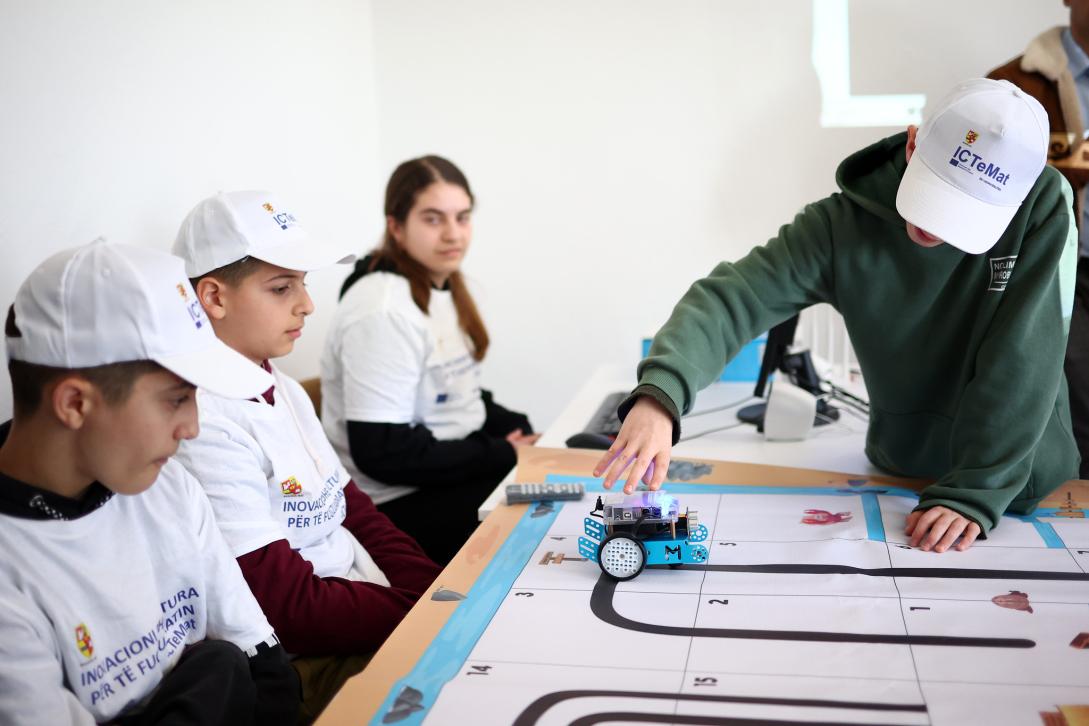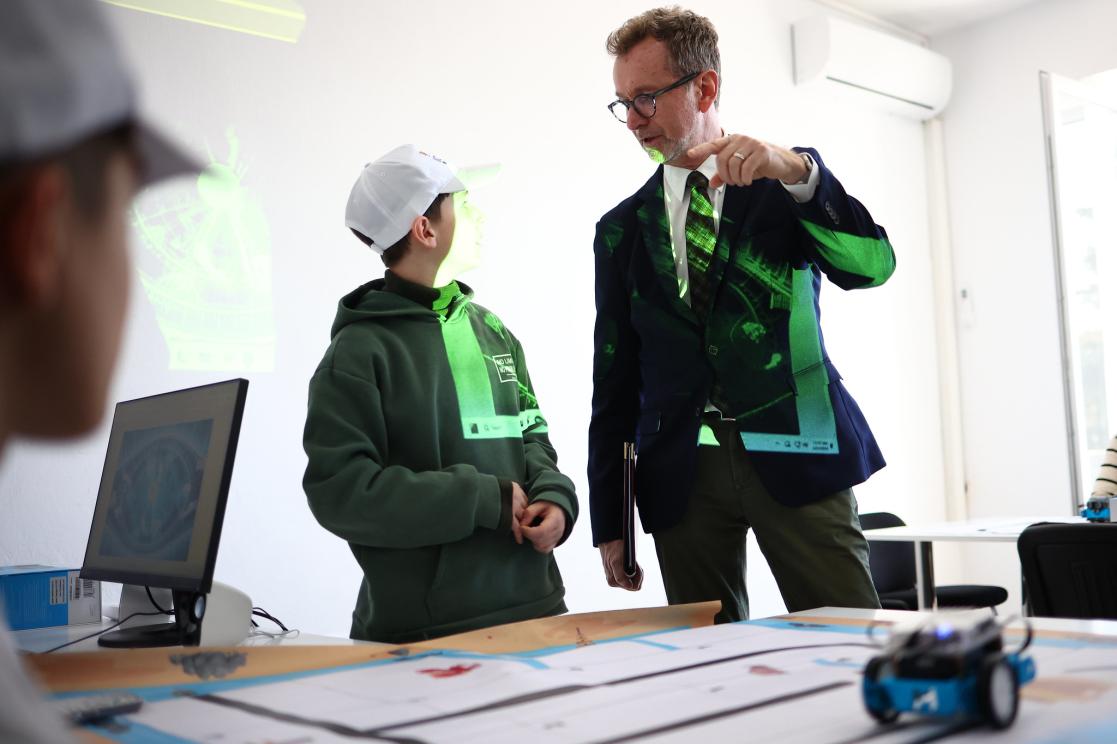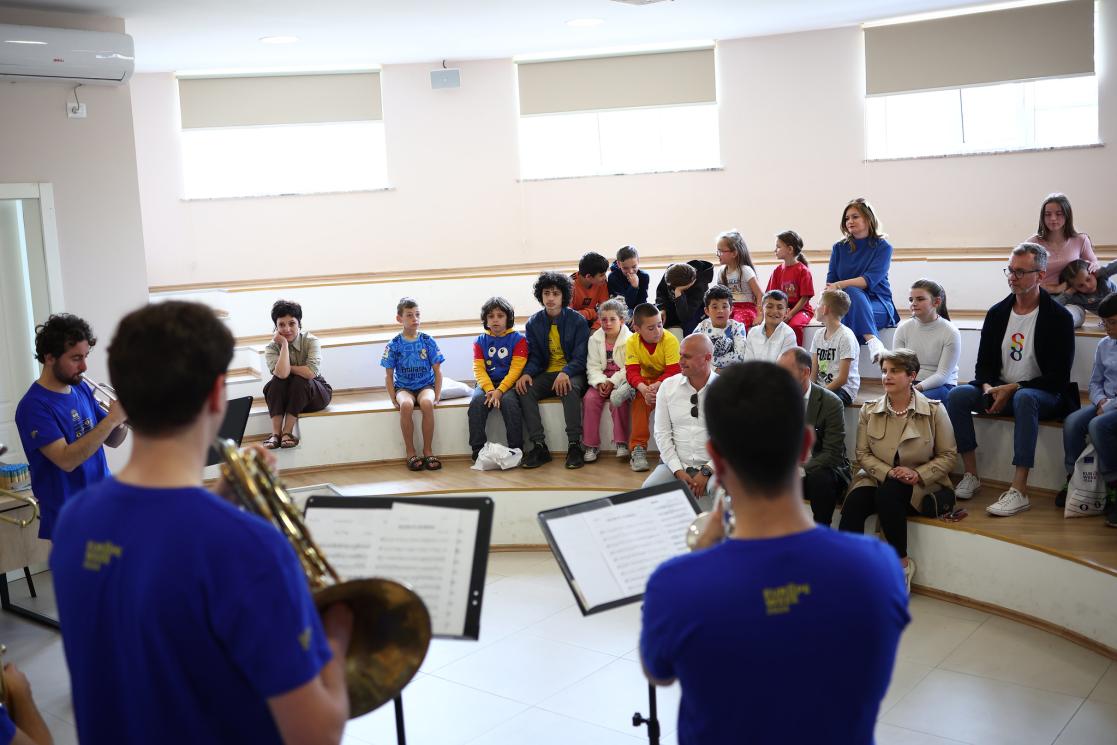EU4Municipalities: Renovation, youth initiatives, green energy in one programme

An 8-year-old boy designing a city building on a laptop is now a common sight the at Innovation and Culture Unit in Mat, a small city in northern Albania. With a passionate interest in design and moving objects, the little boy is one of the 200 children from 6-14 years old, which have been taking courses on robotics, design and coding.
“Children love games like 'Super Mario' because they captivate their interest. Here, they learn how to programme these games, understand how robots work, and even design buildings as they imagine them. Sometimes we are afraid of technology, but this is the brighter side: children learning how to use it in the best way, to be creative and learn how to improve their skills and enjoying it as it was a game”, explains Elson Reçi, the coordinator of ICTe-Mat, Innovation and Culture to Empower Mat, a youth centre project.
Since its launch, the centre's courses have been popular, attracting 80 young learners in the first week. After a month, children from nearby cities also enrolled, eager to learn more on world of algorithms, 3D design, and future technologies. “We have a sort of small laboratory, but in the future, we can have more advanced lessons,” says Reçi, who considers this centre a gold mine for its impact on children.

EU Delegation to Albania
The Palace of Culture "Shefqet Doda" in Burrel, named after the first conductor from Mat, has been renovated and transformed into an innovation centre with financial support from the European Union under the EU4Municipalities programme. The building, now equipped with ballet and music halls, an art gallery, and a conference hall, is one of 24 public buildings renovated across 19 municipalities as part of the programme.
EU4Municipalities is a multisector initiative supporting sustainable economic development, local infrastructure modernization, environmental protection, green energy, and the promotion of youth, sports, and culture. “The programme came as a natural development for the phase where Albania is in the European integration process. Municipalities create and manage public spaces and services that directly affect the quality of life of the citizens. Municipalities as a local level of government implement up to 70% of EU legislation and therefore have an important role in the absorption of grants as well as EU service standards” explains Elton Stafa from the EU4Municipalities programme in Albania.

EU Delegation to Albania
With €1.7 million in financial support for 19 municipalities, 68 public services were opened or improved, benefiting 49,000 citizens, including 32,000 young people. Projects were selected through an open call and consultation with local communities to address their needs. From Shkodra in the north to Gjirokastra in the south, investments focused on various facilities and initiatives, including youth centres in Përmet, Lushnja, Tropoja, Rrogozhina, and Mat; sports facilities in Skrapar and Puka; a tourist information point in Shengjin; a green rooftop and educational greenhouse in Tirana; a children's cultural centre in Patos; and community playgrounds in Klos and Rrëshen.
Other notable projects include a school in Kuçova, a multifunctional centre for marginalized groups in Fushë-Arrëz, three educational buildings in Berat, innovation centres in Mat and Puka, a multifunctional community centre in Shkodër, and a market for traditional Roma crafts in Gjirokastra. In Kavaja, solar panels were installed, while green policies were promoted through projects like the implementation of waste separation systems in 25 schools in Kamza, involving 752 students in eco-friendly initiatives and expanding green spaces around the facilities.
This multisectoral approach has not only targeted various areas but also included different communities, promoting inclusiveness and equal opportunities for all citizens. The market for traditional Roma crafts is a prime example.
"In Shkodër, an old veterinary school has been revitalized into 'Xixëllonja,' a multifunctional centre for children with healthcare services, a kindergarten, a playground, and a nursery— the first in the area. In Berat, the reconstructed Education Service Centre has become a place where teachers, parents, and the community can engage in training and discussions. The Educational Directorate's increased support for children with disabilities and their parents marks a significant step forward," emphasizes Elton Stafa.

EU Delegation to Albania
Lorena Bardelli from the Municipality of Shkodër highlights how 'Xixëllonja' has transformed the neighbourhood, creating a new cultural and social hub. Marius Qytyku, Director of the European Integration and Projects Directorate in Berat Municipality, notes that the Education Service Centre's interventions have brought decision-makers, teachers, parents, and students closer together.
By combining infrastructure improvements with new initiatives, social care, and youth empowerment, the EU4Municipalities programme helps society advance. At the same time, children learn interdisciplinary skills like mechatronics and programming, preparing them for the future while enjoying the present.
BACKGROUND INFORMATION
EU4Municipalities is a project funded by the European Union, which aims fostering municipalities’ development potential and improving the socio-economic and environmental conditions of local communities in Albania. It supports the development of local infrastructure by providing better public services and sustainable local economic development. Additionally, one of the objectives of the project is to support strategic processes and enable local government actors to mobilize resources to implement their plans and strategies, by prioritizing the development of local communities, improving governance and thus the quality of life of citizens. This programme is implemented jointly with NALAS, Co-PLAN, and Swiss Agency for Development and cooperation.





